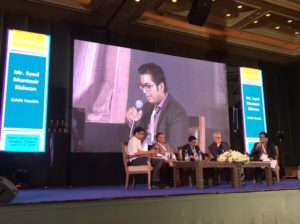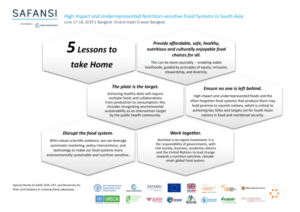Leveraging public-private partnerships to champion better nutrition in South Asia
* Originally published by the SUN Business Network More than 120 government officials, civil society organisations, private sector members and international donors from across South Asia gathered on 17-18th June 2019 at a regional roundtable hosted by SAFANSI, the World Bank’s South Asia Food and Nutrition…
* Originally published by the SUN Business Network
 More than 120 government officials, civil society organisations, private sector members and international donors from across South Asia gathered on 17-18th June 2019 at a regional roundtable hosted by SAFANSI, the World Bank’s South Asia Food and Nutrition Security Initiative.
More than 120 government officials, civil society organisations, private sector members and international donors from across South Asia gathered on 17-18th June 2019 at a regional roundtable hosted by SAFANSI, the World Bank’s South Asia Food and Nutrition Security Initiative.
SAFANSI convenes high level researchers, policymakers and stakeholders annually to advocate for multi-sectoral collaboration and action in response to the South Asia region’s most pressing food and nutrition security challenges.
This year the theme of the roundtable was “High Impact and Underrepresented Nutrition Sensitive Food Systems in South Asia”, bringing the current global discourse on the linkages between nutrition, biodiversity and environmental sustainability to the front and centre of the two-day presentations, panel discussions and fireside chats. The roundtable was hosted by the World Bank and in partnership with the European Commission, SUN Movement, FAO, IFPRI, ICRISAT, Biodiversity International, DSM, Food Industry Asia, GAIN and the Global Panel.
Over the course of the two days, a broad range of private sector, civil society and governmental perspectives were brought to the table to discuss how nutritionally dense underrepresented and high impact foods (such as fish, algae, indigenous crops and pulses) could be a sustainable, climate resilient and economically viable solution to ease the burden of malnutrition across the region.
SUN Business Network Bangladesh Coordinator, Syed Muntasir Ridwan moderated a panel discussion on “Promoting healthy nutritious indigenous crops and heritage foods” which highlighted SAFANSI’s multi-sectoral approach, bringing together representatives from the development, academic and private sectors. The panel considered the need for a clear call for government to reorient policy around reducing malnutrition by shifting their focus away from rice towards diverse indigenous crops and heritage foods. It was also agreed that public distribution systems and farmers’ organisations could be useful mechanisms to increase the scale of underutilised crops.
 Ensuring the affordability of nutritious food was at the heart of discussions for addressing malnutrition in the region. Dr Felipe Dizon, Economist, Agriculture Global Practice, World Bank highlighted that the underlying cause of malnutrition across South Asia is that the cost of nutritious food in developing countries is much higher than unhealthy, less nutritious food. As such, households tend to overspend on starchy, calorie dense foods rather than purchasing nutritious foods which would meet their dietary requirements.
Ensuring the affordability of nutritious food was at the heart of discussions for addressing malnutrition in the region. Dr Felipe Dizon, Economist, Agriculture Global Practice, World Bank highlighted that the underlying cause of malnutrition across South Asia is that the cost of nutritious food in developing countries is much higher than unhealthy, less nutritious food. As such, households tend to overspend on starchy, calorie dense foods rather than purchasing nutritious foods which would meet their dietary requirements.
Representatives from the private sector also argued that consumer demand for nutritious food is quite low and there has been little effort to increase demand for nutritious food across the region. Taste, affordability and convenience continue to drive consumer demand, and increasingly consumers’ preference is for foods high in sugar, salt and trans-fats. In addition, vegetables are still considered an inferior food, which means that when income allows, consumers overwhelmingly prefer to spend additional income on more meat rather than vegetables.
SAFANSI, in collaboration with the SUN Movement and other key partners, highlighted five key takeaways from the event, namely:
- Provide affordable, safe, healthy, nutritious and culturally enjoyable food choices for all
- Achieve healthy diets through varied foods and collaborations from production to consumption
- Ensure no one is left behind
- Disrupt the food system
- Work together
SAFANSI supports regional multi-sectoral, collaborative efforts towards more integrated food and nutrition security actions, working with existing knowledge networks to develop a strong cadre of food and nutrition advocates, policymakers, and practitioners across South Asia.
Read the full event summary here: www.worldbank.org/en/news/feature/2019/06/26/championing-better-nutrition-in-south-asia